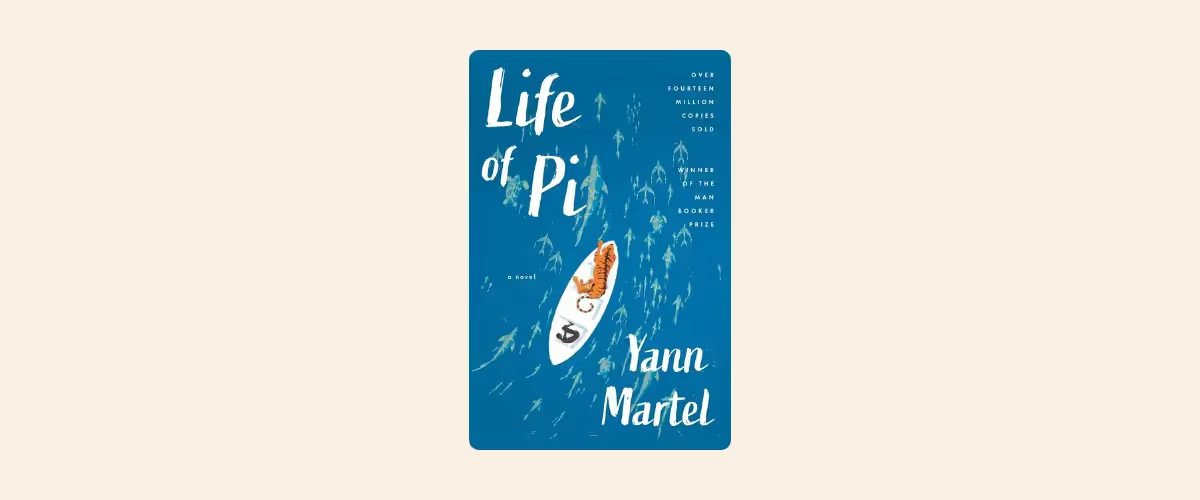Yann Martel is the author of eight published works, including novels, short stories, and collected letters—several of which have been New York Times bestsellers. His third book, Life of Pi, scooped a plethora of awards, including the coveted Booker Prize, the Asian/Pacific American Award for Literature, the Hugh MacLennan Prize for Fiction, and the Boeke Prize. In this blog post, Yann recounts how he fell in love with words and his journey to becoming a bestselling novelist.
Yann has taught a live writing class for members of The Novelry and was a judge for The Next Big Story 2025.
Over to Yann, to share his story!

Falling in love with words
I should start by saying that I’ve never taken a single creative class or read a single creative writing book. But I’ve become a writer, somehow. How did that happen?
If I think back to my earliest independent effort, a short play about a young man who falls in love with a door, truly a terrible piece of drama that will never be published anywhere under any circumstances, I wrote it purely because of the joy of textuality, of being in written words, a joy that has never left me. I still, to this day, love words in and of and for themselves, in the same way a child loves Lego blocks. Which doesn’t mean that I have a greater vocabulary than you, or that I can spell better than you, or that I have any great etymological knowledge (English phonics completely befuddles me). I just like words, that is, visual words, written words. They give me pleasure.
I wrote it purely because of the joy of textuality, of being in written words, a joy that has never left me.
—Yann Martel
That is to say, before I became a writer, I discovered I was a worder.
Discovering story
The next step, which follows closely on the previous one, was the discovery that the meaning of words increases when they’re put together.
This is completely obvious, but I’m going back to when I found this out for myself when I was a young man. For example, the two words a dog—indefinite article plus common noun—is one thing, but the words a dead dog—article, adjective, noun—is a lot more than just three words. We are no longer in the realm of the informational, the original purpose of words; we have entered that of the emotional.
- Why is the dog dead?
- How did it die?
- Who killed it?
Suddenly, there is story.
When I wrote that first, dreadful play, I felt like a god—and gods are always emotional propositions—creating a small world, hence, in part, why this effort was a play, because the stage of a play really is the setting of a small world.
When I wrote that first, dreadful play, I felt like a god.
—Yann Martel
I just said in part because there’s another reason why my earliest attempt was a play. I had just seen the movie Reds, based on the book Ten Days That Shook the World, by the American writer John Reed, about the October Revolution in Russia, by and with Warren Beatty. John Reed was friends with the American playwright Eugene O’Neill, who in the movie is portrayed by the young Jack Nicholson.
There’s a scene in the movie in which Nicholson/O’Neill is sitting at a table in a hotel room working on a play when Diane Keaton walks in and they talk, and, as it happens, I had just taken a summer course in which I had read several plays of O’Neill. I’d never actually made the connection between books and their human creators. We’re talking 1981 here, long before the internet brought us all much closer.
Seeing a charismatically incarnated writer made me think something I had never thought before: ‘Perhaps I can write...’
{{blog-banner-3="/blog-banners"}}
Turning to prose
After that first dreadful play, I wrote another dreadful play, then abandoned drama and turned to short stories because I discovered that, for me, moving a story forward through prose was easier than through dialogue.
I wrote a number of dreadful short stories, but, always, in fact, increasingly so, it was a joy playing with those textual Lego blocks.
I kept at it. Slowly, I got better; that is, theme, style, and content came together. Then I got lucky: a friend sent out a story of mine, and it was accepted by a literary magazine. The validation of publication kept me going. A few more stories appeared in other small magazines, which led to a publisher accepting to bring out a collection of my stories.
By then, I had found that the short story was not my natural narrative gait; I preferred something longer. I tried myself at the novel, a daunting enterprise which I managed to complete by planning carefully and by breaking it down into smaller pieces. My first novel came out, to very modest success.
I tried myself at the novel, a daunting enterprise which I managed to complete by planning carefully and by breaking it down into smaller pieces.
—Yann Martel
But why wouldn’t I continue? It was all so exhilarating, this playing with the artifice of words.
Life of Pi
I had this other idea now, based on a trip I had taken to India... My second novel, and third book, was Life of Pi. Unexpectedly, considering the elements—religion and zoos, in a society deeply secular and disdainful of zoos—it met many readers.
If I think back, then, this is how it went for me:
- A love of the medium
- The discovery of its power
- A trigger
- Experimentation
- Hard work
- Luck
But always I come back to that box of Lego bricks. When I do crosswords, when I play Scrabble, when I write, I’m always doing the same thing: I’m wording. Words are the blocks, and with them, I build.
Wherever you are on your writing journey, we can offer the complete pathway from coming up with an idea through to ‘The End.’ With personal coaching, live classes, and step-by-step self-paced lessons to inspire you daily, we’ll help you complete your book with our unique one-hour-a-day method. Learn from bestselling authors and publishing editors to live—and love—the writing life. Sign up and start today. The Novelry is the famous fiction writing school that is open to all!



.avif)
.webp)
.avif)
